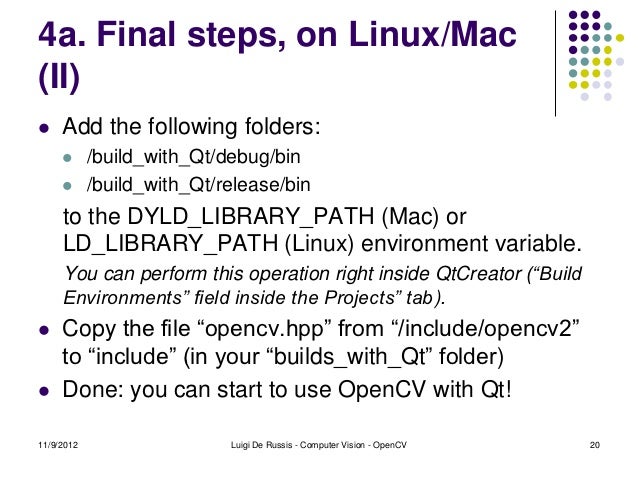Mac Ld_library_path Vs Dyld_library_path
- Mac Ld_library_path Vs Dyld_library_path 2
- Mac Ld_library_path Vs Dyld_library_path 7
- Mac Ld_library_path Vs Dyld_library_path 1
It seems that LDLIBRARYPATH is not set, and moreover I am not even sure if it is used on darwin? On posting to a newsgroup, I was told that I need DYLDLIBRARYPATH instead. May 09, 2019 C17 STL Parallel Algorithms - with GCC 9.1 and Intel TBB on Linux and macOS Posted on May 9, 2019 by Paul. Thanks to Bartlomiej Filipek for the suggestion to try C17 parallel algorithms with GCC 9 and Intel TBB on Linux. GCC 9.1 has support for C17 parallel algorithms by using the Intel TBB library. In this article, I will show you how to build Intel TBB from sources on your machine.
Posted on May 9, 2019 by Paul
Thanks to Bartlomiej Filipek for the suggestion to try C++17 parallel algorithms with GCC 9 and Intel TBB on Linux.
Resolving network errors. Clear cache mac library.
Env grep '^LDLIBRARYPATH' EDIT: LDLIBRARYPATH is for shared libraries that contain machine code, whose filenames typically contain.so in their name, possibly followed by numbers separated by periods in order to distinguish different versions. It is possible that despite LDLIBRARYPATH, a library. Note that different UNIX platforms use different system environment variable for finding shared libraries. On Linux and Solaris, the environment variable name is LDLIBRARYPATH, on AIX it is LIBPATH, on Mac OS X it is DYLDLIBRARYPATH, and on HP-UX it is SHLIBPATH. Oct 01, 2015 In the latest release off OS-X using the DYLDLIBRARYPATH is not possible unless System Integrity Protection (SIP) is disabled. Meaning that setting the DYLDLIBRARYPATH will have no effects on spawned sub shells and therefore using the node client is no longer possible unless one turns off (SIP) as explained here. « Previous « Start » Next » 5 Setting environment variables. On Windows, TOMLAB requires the directory tomlab/shared to be included in the environment variable PATH. On Linux, TOMLAB requires the tomlab/shared folder to be present in the LDLIBRARYPATH environment variable. I tried to import GPU Tensorflow; it failed to find the CUDA libraries. I checked the process.env environment variable and found that LDLIBRARYPATH and DYLDLIBRARYPATH had not been added.
GCC 9.1 has support for C++17 parallel algorithms by using the Intel TBB library. In this article, I will show you how to build Intel TBB from sources on your machine and how to sort a vector of random numbers in parallel using C++17 std::sort.
At the time of this writing, the latest stable version of Intel TBB is version 2019 Update 8. You can find the latest release of TBB on their GitHubrepo. If a newer version was released, change the version number from the next instructions accordingly.
I have instructions about building GCC 9.1 from source on Linux or macOS on other articles on my website.
Let’s start by downloading Intel TBB:
Next, we are going to duplicate one of the existing build files and change the compiler from generic GCC to GCC 9.1:
Mac Ld_library_path Vs Dyld_library_path 2
At about line 15 you will find these two lines:
change them to:
save and close the file (with nano you need to press CTRL-X and answer Y when asked if you want to save it).
Next, we can build the library:

Once the build is finished, you can install it with the next instructions:
At this point, you should be able to use the C++17 parallel algorithms.
Here is a small C++17 test program, that will fill a vector with 5 millions random doubles, with values from 0 to 1. Next, we sort the vector sequentially and in parallel. Each test is repeated 10 times and the elapsed time, in milliseconds, is printed on the screen:
You can build the code, assuming that you saved the file as t0.cpp, by using one of the next lines:
in the above, t0_opt is optimized for speed, while t0 uses the default compiler settings.
Mac Ld_library_path Vs Dyld_library_path 7
Here is what I see on my machine (macOS MacBook Air 2018):
I’ve seen similar results on a Linux machine. The parallel, optimized version, is 2 - 2.5x faster than the serial version. For the non optimized version the difference between the parallel and the sequential version is slightly larger.
Mac Ld_library_path Vs Dyld_library_path 1
- ~Update Rustup and install the nightly toolchain~
- rustup update nightly
- ~Make sure to install all of these components on the same toolchain even if its different from the chain you plan to use~
- rustup component add rls-preview --toolchain nightly
- rustup component add rust-analysis --toolchain nightly
- ~create an enviroment variable for your rust-src folder~
- RUST_SRC_PATH: '%USERPROFILE%.rustuptoolchainsstable-x86_64-pc-windows-msvclibrustlibsrcrustsrc'
- ~link your rust-src folder to VS code/Src folder~
- mklink /D 'C:Program FilesMicrosoft VS Codesrc' '%USERPROFILE%.rustuptoolchainsstable-x86_64-pc-windows-msvclibrustlibsrcrustsrc'
- ~install these on nightly or beta even if you plan to use stable~
- cargo install rustfmt-nightly
- ~setup a enviroment variable/set your path so that VS code can find the libraries~
- Linux: LD_LIBRARY_PATH=$(rustc --print sysroot)/lib:$LD_LIBRARY_PATH
- Mac: DYLD_LIBRARY_PATH=$(rustc --print sysroot)/lib:$DYLD_LIBRARY_PATH
- Windows: '%USERPROFILE%.rustuptoolchainslibrustlibnightly-x86_64-pc-windows-msvclib'